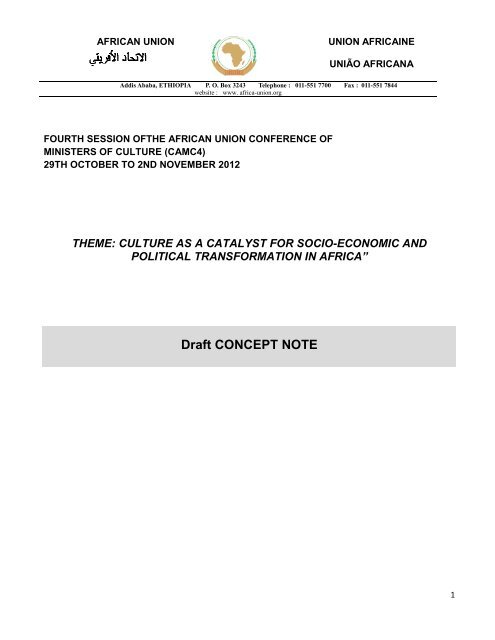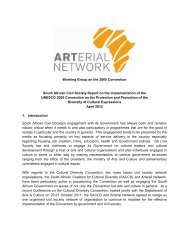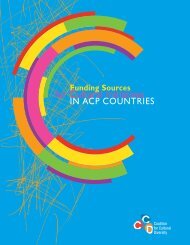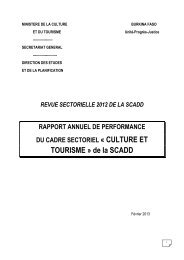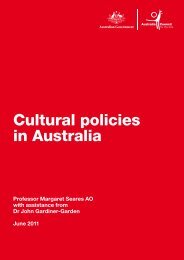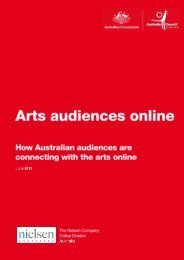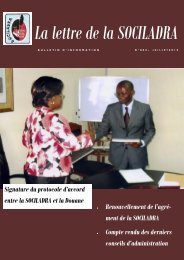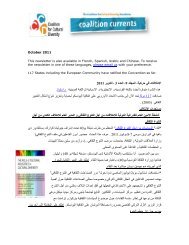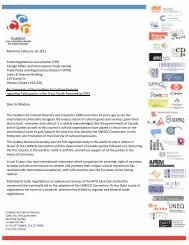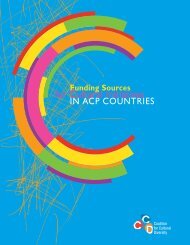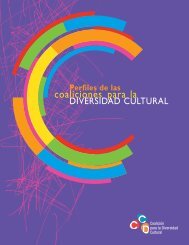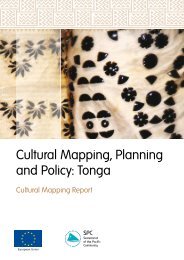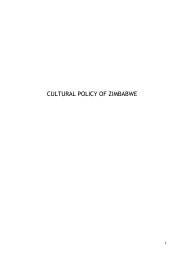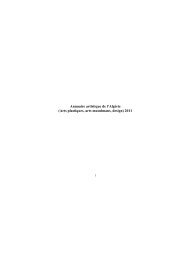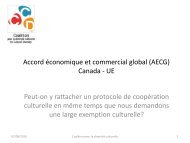Draft CONCEPT NOTE
Draft CONCEPT NOTE
Draft CONCEPT NOTE
- No tags were found...
You also want an ePaper? Increase the reach of your titles
YUMPU automatically turns print PDFs into web optimized ePapers that Google loves.
AFRICAN UNION<br />
UNION AFRICAINE<br />
UNIÃO AFRICANA<br />
Addis Ababa, ETHIOPIA P. O. Box 3243 Telephone : 011-551 7700 Fax : 011-551 7844<br />
website : www. africa-union.org<br />
FOURTH SESSION OFTHE AFRICAN UNION CONFERENCE OF<br />
MINISTERS OF CULTURE (CAMC4)<br />
29TH OCTOBER TO 2ND NOVEMBER 2012<br />
THEME: CULTURE AS A CATALYST FOR SOCIO-ECONOMIC AND<br />
POLITICAL TRANSFORMATION IN AFRICA”<br />
<strong>Draft</strong> <strong>CONCEPT</strong> <strong>NOTE</strong><br />
1
A. Introduction<br />
In line with Executive Council Decision EX.CL/Dec.616 (XVIII), the Department of<br />
Social Affairs is planning to organize in collaboration with the Government of the<br />
Democratic Republic of Congo (DRC), the 4th Session of the African Union Conference<br />
of Ministers of Culture (CAMC4), to be held in Kinshasa, DRC from 29th October to 1st<br />
November 2012 under the theme “Culture as a Catalyst for Socio-Economic and<br />
Political Transformation in Africa”.<br />
Development was initially conceived in the narrow economic sense of a mere<br />
increase in the Gross Domestic Product (GDP) or per capita income. Nowadays,<br />
however, emphasis is being placed not only on GDP alone but also on other socioeconomic<br />
indicators. Increasingly cultural and creative industries such as the crafts,<br />
books and publishing, visual arts, design, music, dance, theatre and audio visuals are<br />
becoming significant contributors to GDP and as such culture and the arts are<br />
considered as the engine for socio-economic transformation in Africa. If development is<br />
a phenomenon of qualitative transformation of a society or group of individuals with a<br />
common life experience, then cultural development is the qualitative societal<br />
transformation that builds on the identity and cultural resources of the community<br />
concerned. Time has come for us to treat culture as an inseparable bound with industrial<br />
development and development should be first and foremost cultural.<br />
Political transformation in the cultural development sector should be enhanced to<br />
ensure that the adopted cultural polices and their legal institutional frameworks are fully<br />
implemented so as that the produce the most needed renew from cultural and creative<br />
industries.<br />
It is against this background that the 2 nd Meeting of the Bureau of the 3 rd Session<br />
of the AU conference of Ministers of Culture endorsed the theme of “Culture as a<br />
Catalyst for Socio-Economic and Political Transformation” to enhance its debate<br />
and to formulate specific actions for the promotion of culture as a tool for socio-economic<br />
transformation in Africa.<br />
B. Main objectives of the 4 th African Union Conference of Ministers of Culture<br />
The main objectives of the Fourth Session of the African Union Conference of<br />
Ministers of Culture are to:<br />
- Review the implementation of the continental Campaign for African Cultural<br />
Renaissance 2010-2014 aimed at accelerating the ratification of the Charter for<br />
African Cultural Renaissance;<br />
2
- Discuss the theme of the Conference with a view to promote culture as a catalyst for<br />
socio – economic and political transformation in the continent;<br />
- Raise awareness on the use of social protection of the workers in the art and culture<br />
industry with regards to the Plan of Action on Cultural and Creative industries and the<br />
Social Protection Plan for the Informal Economy and Rural Workers;<br />
- Consolidate and adopt the political and technical recommendations from the 3rd Pan-<br />
African Cultural Congress (PACC3);<br />
- Consider and adopt the Framework for Action on combating Harmful Traditional<br />
Practices (HPT);<br />
- Consider and adopt key recommendations with a view to promote African culture and<br />
enhance its role in attaining sustainable socio-economic development in Africa;<br />
- Review the Feasibility Study for the establishment of the Pan African Cultural Institute<br />
(PACI);<br />
- Present the reports of the African Academy of Languages (ACALAN) and of the<br />
Centre Linguistic and Historical Studies by Oral Tradition (CELHTO) and of other Pan-<br />
African Cultural institutions.<br />
C. AGENDA<br />
The Conference will consider the following main agenda items:<br />
1. Report of the Chairperson on cultural activities for the period October 2010 to<br />
October 2012;<br />
2. Matrix of implementation of decisions;<br />
3. Report of the3 rd Pan African Cultural Congress and its call/Framework for Action;<br />
4. Review of the preparations of the Pan-African Cultural Space within the new AUC<br />
Conference and Office Complex;<br />
5. Review of the implementation programme of the Campaign for the African Cultural<br />
Renaissance 2010-2014;<br />
6. Review the report of the Feasibility Study for the Establishment of the Pan-African<br />
Cultural Institute;<br />
7. Discussion of the theme of the Conference;<br />
8. Presentation on the use of social protection of the workers in the art and culture<br />
industry with regards to the Plan of Action on Cultural and Creative industries and<br />
the Social Protection Plan for the Informal Economy and Rural Workers;<br />
9. Report of the African Academy of Languages (ACALAN)<br />
10. Report of the Centrefor Linguistic and Historical Studies by Oral Tradition(CELHTO)<br />
11. Items proposed by Members States<br />
D. FORMAT OF THE CONFERENCE<br />
The Fourth Ordinary Session of the AU Conference of Ministers of Culture will be<br />
3
conducted as follows:<br />
a) Meeting of Inter-governmental Experts, (29 and 30 October 2012)<br />
Experts from Member States will meet over two (2) days to deliberate on the abovementioned<br />
agenda items and prepare a report for the Ministerial Meeting.<br />
b) Meeting of Ministers, (1 st and 2 nd November 2012)<br />
The Ministers will discuss and share ideas on the theme of the conference and<br />
consider the report of the Experts’ meeting.<br />
E. EXPECTED OUTCOMES OF THE CONFERENCE<br />
It is expected that the recommendations of the experts meeting will inform the<br />
discussions of the meeting of Ministers and will lead to a concrete roadmap for effective<br />
collaboration by the various actors and stakeholders in the field of culture.<br />
It is also expected that the Conference will contribute to achieve the following main<br />
outcomes:<br />
• Extensive discussion on the main theme of the Conference and adoption of a<br />
roadmap for the promotion of culture as a catalyst for socio-economic and political<br />
transformation in Africa;<br />
• Adoption of the recommendations of the 3 rd Pan African Cultural Congress (PACC<br />
3);<br />
• Adoption of a recommendation related to the review of the threshold set for the<br />
entering into force of the Charter for African Cultural Renaissance;<br />
• Renewal of the Member States commitment to accelerate the ratification of the<br />
Charter for the African Cultural Renaissance;<br />
• Strengthening of the ties and partnerships between the Member States, cultural<br />
development partners, RECs, International Organizations, Diaspora, and the AUC<br />
for the Culture development and the promotion of the role of Culture vis-à-vis the<br />
integration and the sustainable development of the continent.<br />
• Commitment by Member States to provide artifacts and artworks for the AUC Pan-<br />
African Cultural Space;<br />
• Adoption of concrete recommendations to strengthen CELHTO and ACALAN as the<br />
African Union flagships programmes for Oral Traditions and African Languages in<br />
the continent as well as other Pan-African Cultural Institutions in the continent.<br />
F. DOCUMENTS<br />
In addition to the relevant documents which will be available on the AU website,<br />
reports and other documents will be circulated during the Conference, in accordance<br />
with the conference agenda items.<br />
4
G. ORGANISATIONAL MATTERS<br />
The AU Commission will organize the Conference while the Government of<br />
The Democratic Republic of Congo will host the event.<br />
H. PARTICIPANTS<br />
Participants to the Conference will include: Ministers of Culture of the African<br />
Union Member States, Culture Experts, International and Continental Cultural<br />
Associations, Civil Society Organizations, International Organizations and Agencies,<br />
Regional Economic Communities (RECs) and AU Commission representatives.<br />
I. ADDITIONAL INFORMATION<br />
Information on the Conference will be posted on the AU website:<br />
www.africa-union.org<br />
For additional information, kindly, contact the following officials:<br />
• African Union Commission<br />
Amb. Olawale Maiyegun, PhD<br />
Director of Social Affairs<br />
Department of Social Affairs<br />
African Union Commission<br />
Email: MaiyegunO@africa-union.org<br />
cc:-<br />
Ms. Angela Martins<br />
Senior Cultural Officer<br />
Department of Social Affairs<br />
African Union Commission<br />
Tel: + 251 115182279/ +251115182225<br />
E-mail: MartinsA@africa-union.org and NtayeA@africa-union.org<br />
• Ministry of Culture of the Democratic Republic of Congo<br />
Mr. Bosongo Barthelemy<br />
Director of the Minister’s Cabinet<br />
Ministry of Youth, Sport, Culture and Art<br />
Kinshasa, Democratic Republic of Congo<br />
Tel: + 243 998 916 319<br />
Mobile: + 243 812011913<br />
E-mail: bosongo_barthelemy@yahoo.fr; cc Etienne.unega@yahoo.fr<br />
5


